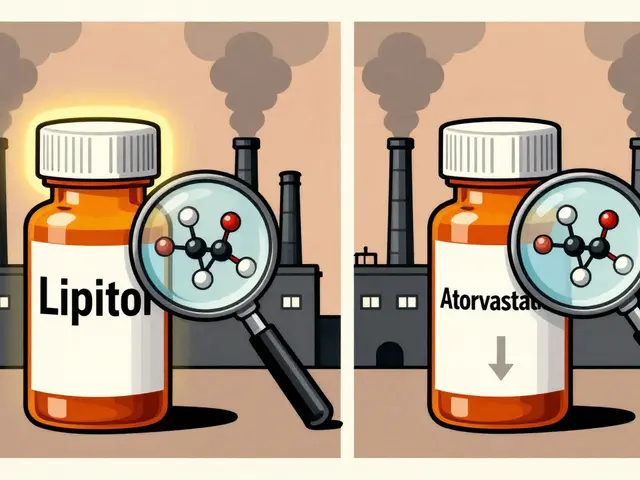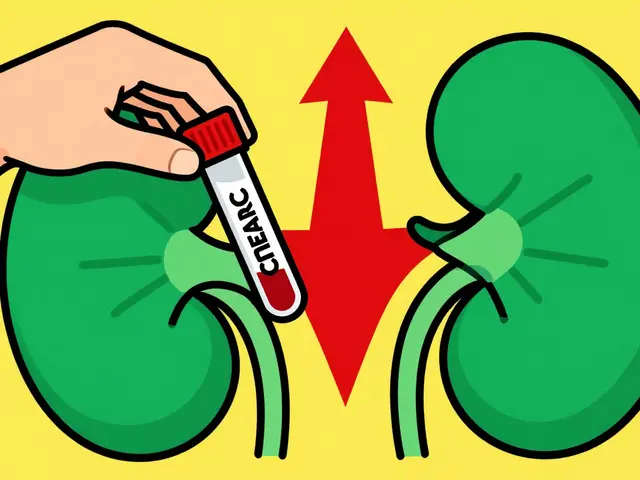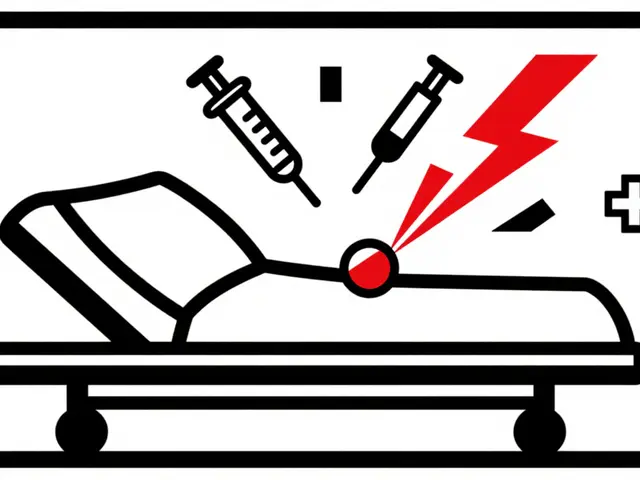People don’t usually think much about their cholesterol until the doctor spells out those numbers and drops the dreaded 'statin' word. Lipitor turns up in these conversations a lot, and that’s no surprise when you look at its track record. But there’s plenty more to Lipitor than being a pill your GP suggests when your heart health is on the ropes. It’s at the core of one of modern medicine’s biggest fights—keeping our arteries clear and our hearts ticking without drama. If you’ve just been handed a prescription or are curious about what’s behind the Lipitor label, it pays to know the real story.
How Lipitor Earned Its Spot at the Top
Back in 1997, Lipitor wasn’t just another new pill on the market. It burst onto the scene with the power to slash so-called “bad” LDL cholesterol—sometimes by more than half. Doctors, who previously had limited options, suddenly had a statin that flipped the script for people on the brink of a heart attack or those with stubbornly high cholesterol. The numbers are jaw-dropping: for years, Lipitor has ranked among the most prescribed drugs ever. Across Australia, GPs hand it out like footy tips before finals season, and pharmacies always keep it in stock—right up there with paracetamol or allergy treatments.
But Lipitor (known by its generic name atorvastatin) doesn’t just lower cholesterol. It’s also been proven to reduce the risk of heart attacks, strokes, and even slow down the progression of heart disease. That isn’t just drug-company spin; large-scale studies like the 2005 TNT Study (Treating to New Targets) showed real drops in new heart events for people on Lipitor, sometimes up to a third less if they stuck with it. As of this year, close to one in five adults over 45 in Australia has tried a statin at some point, and a huge chunk of them were started on Lipitor. Its hold on the market isn’t just about brand-name power—the data keeps backing it up, year after year.
Parents, siblings, even teenagers with genetic high cholesterol can end up on Lipitor. It’s not only about people who eat poorly or dodge the gym. Familial hypercholesterolemia, affecting about 1 in 250 Aussies, practically guarantees early heart problems unless treated, and Lipitor’s often the first solution out of the gate. If you’re putting off a cholesterol blood test because you fear what comes next, Lipitor is likely to surface in your future. Doctors see it as powerful, reliable, and, when compared with many other long-term meds, pretty straightforward to use.
How Lipitor Works: The Nuts and Bolts
Most of us never wonder how our bodies churn out cholesterol, but it’s all happening behind the scenes in your liver. That’s where Lipitor comes in. It’s a statin, meaning it shuts down HMG-CoA reductase—a fancy-named enzyme your liver uses to make cholesterol. Picture your liver as a cholesterol factory, and Lipitor as the security guard turning off the production line. With less cholesterol coming off the conveyor belt, your arteries stay clearer, which means a lower risk of them clogging up from plaques that can cause heart issues.
But Lipitor doesn’t put you at zero risk or act like a magic shield. That’s a myth. What happens is the LDL cholesterol drops, sometimes by 30-60%, while your “good” HDL cholesterol can creep up a bit too. But lifestyle plays a monster role too. If you still live on takeaway burgers and don’t move much, Lipitor’s fighting a tough battle on its own. That’s why docs always nudge you toward eating better and walking more, even after prescribing Lipitor. The trick is that results show up in your bloodwork, not how you feel. You might not notice a single thing changing day to day, but your future self—ten or twenty years from now—could be way better off.
Most people take Lipitor as a once-daily tablet, usually in the evening. That’s because your liver is most active making cholesterol at night, so the pill’s working when it matters. It doesn’t cause drowsiness or keep you awake, so don’t stress about timing it to the minute. And here’s a little-known fact: Lipitor doesn’t interact much with food, making it one of the easier statins to fit into daily routines.

Side Effects, Myths, and Safety Checks
If you google Lipitor, you’ll get hit with lists of side effects ranging from slightly annoying to downright terrifying. Reality’s a bit less dramatic. Most people have zero or only very mild issues. The most common complaints? Some muscle aches, slight tummy upset, maybe a headache or two. Only around 1 in 10 report even minor symptoms, and far fewer have to stop taking it.
The most talked-about issue is muscle pain or weakness. This gets more play than it deserves, but it’s closely watched because in a handful of people, muscle injury (called rhabdomyolysis) is a risk—super rare, but worth mentioning because it’s potentially serious. If you wake up with unexplained muscle pain and dark pee, not related to your workout or footy practice, don’t just blow it off. See your doctor.
Another thing people ask: will Lipitor wreck my liver? For almost everybody, the answer is no. Blood tests before and during treatment look out for rare liver issues, but problems pop up in less than 1% of users. If you already have liver disease or drink more than a few beers a week, your doctor might steer you toward extra checks or a different statin. The deal is to keep your GP in the loop about any out-of-nowhere fatigue, yellowing of the eyes, or aches that don’t quit.
One persistent myth is memory loss; some patients worry because they’ve read stories online. The biggest studies say there’s no strong link, but everyone’s different. If something feels off, let your doctor know.
And don’t stress about statins destroying your sex life or causing wild mood swings—there’s no real evidence. But here’s a wild card: grapefruit and grapefruit juice can mess with how Lipitor is broken down. If you’re a grapefruit lover, best to skip it or check with your pharmacist.
Making Lipitor Work: Smart Tips for Daily Life
If there’s one thing people forget, it’s that the best results from Lipitor don’t just come from swallowing a pill. Think of the tablet as half the answer, with the other half living in your daily routines.
- Stick to your dose. Don’t skip days, don’t double up if you forget. Just get back on track the next day. The key is consistency—you want those cholesterol numbers under control every day, not just when you remember.
- Keep up with blood tests. Your doc will likely check your cholesterol, liver function, and sometimes muscle enzymes every 3-12 months. It feels like a hassle, but it’s how you spot trouble before it snowballs.
- Eat smart, move more. Lipitor is cholesterol medication, not a ticket to ignore your diet. Cutting back on saturated fats (think: fatty meats, butter, deep-fried chips) multiplies the effect of the medication. Even just walking thirty minutes several days a week gives your arteries extra protection.
- Watch alcohol. Partying hard can make liver side effects more likely, and extra calories don’t help cholesterol either. Most doctors say a couple of standard drinks a day is probably okay, but heavier drinking is a no-go.
- Tell all your docs about Lipitor. If you see a new specialist or try supplements, make sure they know you’re on it—it can interact with certain antibiotics, meds for HIV, and a handful of antifungals.
- Don’t mix with certain supplements. Red yeast rice, sometimes sold in health stores or online, contains a statin-like compound. Doubling up isn’t good and can trigger side effects, not better heart results.
It’s normal to be skeptical about starting a daily pill, especially if you’re still young or 'feel fine.' But the goal is fixing a problem that sneaks up silently, not one you feel in the moment. If you have side effects, don’t bail without chatting with your doctor. Sometimes a lower dose, a different statin, or switching to nighttime dosing can fix things.

Lipitor, the Latest Science, and What’s Next
The story with Lipitor keeps evolving. Until recently, people assumed you took it for life—but new guidelines sometimes call for regular reviews, especially if your numbers improve big time. There’s even talk in heart circles about “therapeutic holidays,” where a person who’s hit all their cholesterol targets for a few years might cut back or pause their statin under close supervision—but this is very much a case-by-case thing and not the norm yet.
Doctors now focus more on risk calculators rather than just cholesterol numbers. If you have Type 2 diabetes, a history of smoking, or a strong family heart history, you might be started on Lipitor even if your cholesterol isn’t sky-high. The point is preventing trouble, not waiting for it to show up.
Original Lipitor went off patent years ago, so generic atorvastatin is just as effective and usually costs way less. Across Perth, most people get the generic from their local chemist with no fuss—fewer headaches for wallets, same benefits. “Is it safe to switch brands?” is a question pharmacists hear all the time, and the answer’s nearly always yes, unless you have odd allergies or reactions to specific fillers.
The other big news: combination pills. If you need to lower both cholesterol and blood pressure, new options combine statins with other drugs in a single tablet. Less pill juggling, easier on the memory, and better for compliance.
And while a few other medications for cholesterol (like PCSK9 inhibitors) are making waves, they’re not for everyone—they’re expensive, usually by prescription from a specialist, and given as injections. For most people, Lipitor (or its generic) is still the go-to, with a mountain of research to back it up.
What does the future hold? Researchers in Sydney and Melbourne are looking for ways to personalise statin therapy with advanced blood tests and even gene markers to predict who gets side effects and who will benefit most. So the next generation of Cholesterol 2.0 could be far more targeted than the shotgun approach we use now.
If you or someone close to you takes Lipitor, you’re in very big company. It’s one of those rare medications that really changed the odds for millions, even while inspiring lots of questions and the odd urban legend. Your best bet is to get informed, ask your GP the hard questions, and remember: the goal isn’t just a better blood test, it’s a longer, healthier life—one less likely to be interrupted by hospital visits or scary moments on the street.







JOANNA WHITE
June 16, 2025 AT 17:40Lipitor's not magic, but it's one of the few pills that actually delivers on its promise. I've been on it for 7 years, my LDL dropped from 190 to 78, and I haven't had a single side effect. Just take it consistently, eat less junk, and don't panic every time you Google 'statin risks.' Your future self will thank you.
Also, generic atorvastatin is literally the same thing. Save your money.
Alyssa Hammond
June 17, 2025 AT 10:08Let’s be real-Big Pharma wrote this whole article. Lipitor’s not a ‘game changer,’ it’s a cash cow. They scared people into thinking cholesterol is the enemy, then sold them a pill that barely moves the needle for most. Meanwhile, real heart health comes from whole foods, movement, and sleep-not a daily tablet that makes your muscles ache.
I’ve seen people go off statins and feel better than ever. The ‘data’ they cite? Funded by Pfizer. Coincidence? I think not.
And don’t even get me started on grapefruit being the ‘villain.’ That’s just a convenient scapegoat so they don’t have to admit the drug’s inherently toxic.
They want you dependent. Don’t be their puppet.
erin orina
June 18, 2025 AT 07:10Thank you for writing this. I was so scared to start Lipitor after reading horror stories online. This actually helped me feel calm about it. I started 4 months ago, and honestly? I feel the same-but my numbers are perfect now. No muscle pain, no weird dreams, no nothing.
Just take it. And eat the veggies. 😊
Kate Calara
June 18, 2025 AT 11:19They don’t tell you the truth about statins because the FDA is in bed with the drug companies. Did you know that the ‘reduced heart attack risk’ is only for people who already have heart disease? For healthy people? It’s basically a placebo with side effects.
And liver damage? They say ‘less than 1%’ but the real numbers are buried in fine print. I know someone who had to go on dialysis after 3 years on Lipitor. They never connected it until it was too late.
They’re selling fear. Don’t buy it.
Cameron Perry
June 20, 2025 AT 01:53Wait, so if I’m 38, active, eat clean, but have familial hypercholesterolemia-do I really need this? I’ve heard some docs say ‘no’ if your lifestyle’s perfect. Is that legit or just wishful thinking?
JOANNA WHITE
June 22, 2025 AT 01:44@Cameron Perry-yes, you do. Familial hypercholesterolemia isn’t about diet or exercise. It’s genetic. Your liver makes cholesterol like a factory on overdrive. No amount of kale will fix that. Lipitor doesn’t ‘fix’ your lifestyle-it fixes what your body can’t do on its own.
I’ve got it too. I run marathons. Still take it. Every. Single. Day.
Lisa Uhlyarik
June 22, 2025 AT 15:45Everyone’s so obsessed with cholesterol like it’s the devil. But what about inflammation? That’s the real killer. Statins reduce inflammation too, which is why they work. But no one talks about that because it’s not as simple as ‘lower LDL = save life.’
It’s deeper than that. You’re not just taking a pill-you’re intervening in your body’s entire inflammatory cascade. That’s powerful. And scary. And real.
But also, who are we to play God with our biology? Maybe we should just eat less sugar and stop pretending we can outsmart evolution with a pill.
Jill Amanno
June 24, 2025 AT 01:03You think Lipitor’s the answer? You’re missing the point. We’ve turned medicine into a band-aid culture. We don’t fix systems-we fix symptoms. The system is broken. We’re not supposed to live to 80 with five daily pills. We’re supposed to live well. Lipitor doesn’t teach you how to live. It just lets you keep living badly.
And yet… I still take it. Because I’m not brave enough to bet my life on ‘eating better.’ I’m just a tired person who wants to see her kids graduate.
So yeah. I take it. But I hate that I have to.
Tammy Cooper
June 24, 2025 AT 02:42My mom’s been on Lipitor since 2010. She eats pizza every Friday, watches Netflix in her pajamas, and still has the cholesterol of a 25-year-old. So yeah, the pill works. But also… why are we so surprised? It’s not the miracle they make it out to be-it’s just a damn enzyme blocker.
Stop acting like it’s yoga or enlightenment. It’s chemistry. Pure and simple.
Also, grapefruit juice is gross anyway. 😒
Denise Wood
June 24, 2025 AT 19:13Side note: If you’re on Lipitor and you’re also taking a supplement called ‘Red Yeast Rice,’ stop immediately. It’s basically natural Lipitor. Doubling up = higher risk of muscle damage. I work in pharmacy. Saw three ER cases last year from this exact combo.
Just say no to ‘natural statins.’ They’re not safer. They’re riskier.
Phillip Lee
June 25, 2025 AT 11:00Statins aren’t perfect but they’re the best tool we have. The data is overwhelming. If you’re over 45, have any risk factors, and your LDL is above 100-you’re not being paranoid. You’re being smart.
Stop listening to influencers who don’t have a medical degree. Your doctor didn’t pick Lipitor because they got a free lunch from Pfizer. They picked it because it’s been studied in over 200,000 people.
Trust the science. Not the noise.
Taylor Smith
June 26, 2025 AT 03:50What’s the deal with timing? I’ve heard evening is best, but I forget every night. Does it really matter if I take it at 8am instead of 10pm?
JOANNA WHITE
June 27, 2025 AT 06:49@Taylor Smith-morning’s fine. Your liver still makes cholesterol all day. Evening’s ideal because peak production is overnight, but consistency matters more than timing. I take mine with breakfast and my numbers are perfect.
Don’t stress about the exact hour. Just don’t skip.
Shivani Tipnis
June 28, 2025 AT 17:27Why are we still talking about cholesterol like it’s the enemy? It’s not. It’s essential. The problem is oxidized LDL from sugar and processed oils. Lipitor doesn’t fix that. It just lowers the number on the lab report.
My uncle took Lipitor for 10 years. Still had a heart attack. Why? Because he drank soda every day. The pill doesn’t replace wisdom.
Fix your diet. Not your numbers.
Priyamvada Toshniwal
June 30, 2025 AT 06:03I’m from India and statins are way cheaper here. My dad’s on generic atorvastatin-costs like $2 a month. We don’t have the same fear culture around it. People just take it like aspirin.
It’s not a big deal. It’s medicine.
Also, no one here talks about grapefruit. We don’t even eat it much.
Cindy Fitrasari S.
June 30, 2025 AT 16:31I used to hate taking pills. But after my dad had a stroke at 58, I started Lipitor. I don’t think about it anymore. It’s just part of my routine. Like brushing my teeth.
It’s not about fear. It’s about showing up for yourself.
And yes, I still eat chocolate. Life’s not all or nothing.
Peggy Cai
July 1, 2025 AT 10:28They say it reduces heart attacks but what about the silent deaths? The ones from kidney failure? The depression? The cognitive decline? Nobody talks about those because they’re not in the marketing brochures
They want you to live longer but not better
Is that really progress?
Nancy N.
July 2, 2025 AT 01:38just started lipitor last week and already feel weirdly tired. is that normal? or should i be worried?
JOANNA WHITE
July 2, 2025 AT 15:49@Nancy N.-fatigue in the first 2 weeks is common. Your body’s adjusting. If it lasts longer than 3 weeks or gets worse, talk to your doc. But most people’s energy comes back after a bit.
Don’t quit yet. Give it time.
Frederick Staal
July 2, 2025 AT 18:54How dare you glorify pharmaceutical dependency? This isn’t healthcare. It’s corporate control disguised as science. Lipitor is a symptom of a broken system that profits from illness, not wellness. The real tragedy isn’t high cholesterol-it’s that we’ve surrendered our agency to chemical bandages while ignoring root causes. Your liver isn’t broken. Your lifestyle is. And you’re being sold a lie wrapped in a pill.
Wake up.